Ahmed Moalim Hirsi retires after dedicating 26 years on the frontlines of polio eradication in Somalia
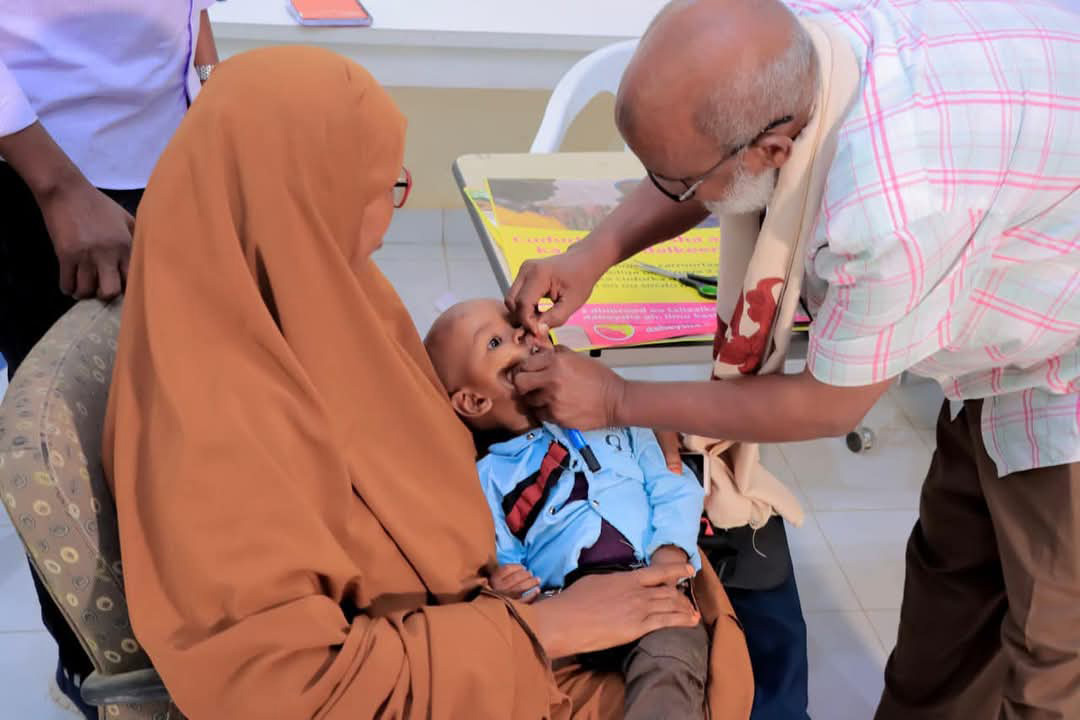 2 February 2025 – At 65, Ahmed Moalim Hirsi reflects on a lifetime of service dedicated to improving the health of people in Somalia.
2 February 2025 – At 65, Ahmed Moalim Hirsi reflects on a lifetime of service dedicated to improving the health of people in Somalia.
After 26 years as a polio eradicator with WHO Somalia, Ahmed retired in 2024, after a career characterized by resilience, dedication and impact.
Ahmed’s journey with WHO began in April 1998 in Bosaso, a city on Somalia’s north-east coast, during a time of immense humanitarian challenges for the country brought on by ongoing conflict and recurring droughts.
A graduate of the Mogadishu Nursing School, gaining a diploma in nursing, Ahmed was no stranger to serving in critical roles in health care. From 1982 to 1989, he had served families living in remote locations before joining WHO.
As part of the pioneering WHO team in Puntland, which then comprised the regions of Bari, Nugal and Mudug, Ahmed was initially tasked with polio surveillance in Bari, Somalia’s largest region. He then served as Regional Polio Officer for Bari from 2001 to 2005, and later as the Puntland Zonal Polio Officer for 19 years, leading polio eradication efforts in Puntland, mentoring teams, overcoming security challenges and ensuring that life-saving vaccines reached even the most inaccessible children.
The fight against polio in Somalia
Ahmed’s efforts have been crucial in Somalia’s fight against polio. His leadership, particularly in Puntland, has laid a strong foundation for the country’s polio eradication initiatives, resulting in a significant reduction in cases over the years.
“When I started, Somalia was in turmoil, and security and living conditions were difficult, but the need for our work was immense. We brought hope to communities by fighting polio, one child at a time.” Ahmed recalls of the early days.
Reflecting on his work, Ahmed remembers the first polio case he encountered in 1999: a young girl in Bosaso, a case of acute flaccid paralysis, later confirmed to be caused by wild poliovirus. This marked the beginning of a long, determined battle against polio.
Ahmed observes that one of the greatest challenges in the early days of his work was the widespread misinformation and distrust among communities. Misguided beliefs about the polio vaccine circulated rapidly, with rumours claiming it could harm children or stunt their growth.
“One of the hardest parts was combating misinformation and propaganda against the vaccine. People were skeptical, but through relentless awareness campaigns and community engagement, we gradually changed their perceptions. We partnered with the state government, religious scholars and traditional leaders to build trust, which eventually led to our success,” Ahmed says.
Eradicating wild poliovirus
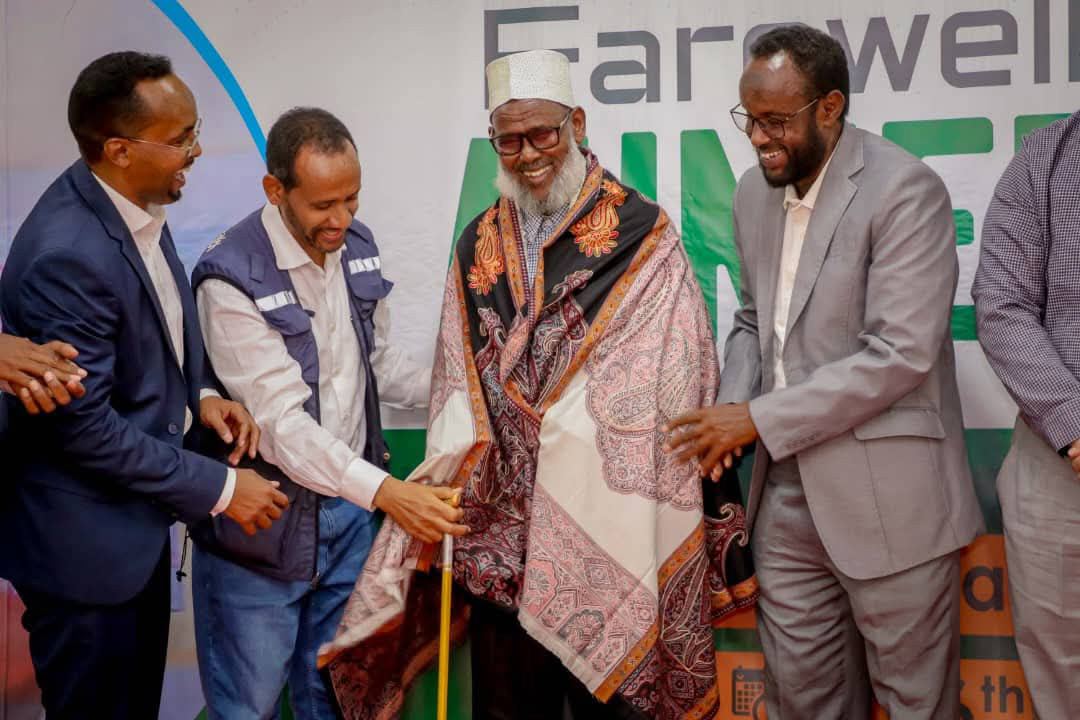 One of Ahmed’s most significant contributions was helping Somalia achieve official wild poliovirus-free status in 2014.
One of Ahmed’s most significant contributions was helping Somalia achieve official wild poliovirus-free status in 2014.
“We ensured that every town and village had skilled teams capable of delivering vaccines to children and women in need. We involved people who understood the community’s needs, such as district field assistants, making a significant difference in accessibility and trust,” he says.
“Eradicating the wild poliovirus from Somalia wasn’t just a success – it was a massive victory. Since 2014, there hasn’t been a single case of wild poliovirus in the country. Today, a large number of children are vaccinated, and vaccine refusal is almost nonexistent,” Ahmed notes proudly.
He emphasizes that the achievement goes beyond numbers alone, highlighting the strong system built by the government, communities and WHO Somalia as a lasting legacy.
“What we built is more than just polio eradication – it’s a strong health system that connects the people, the government and WHO. That system still stands today. I’m leaving behind not only success but also memories of teamwork and shared purpose with my colleagues, who became like family,” Ahmed concludes.
However, this success came with great personal sacrifice. In December 2010, while on a supervision mission in Bosaso, he was involved in a severe motorcycle accident that left him with injuries to his arm requiring metal implants.
“This work has not been without its risks. I still have metal rods in my arm from that accident. But looking back, the sacrifices were worth it. We achieved so much for the children of Somalia,” he says with a smile.
“His story serves as a powerful inspiration to health workers across Somalia. His unwavering commitment highlights the impact of dedication, even in the face of adversity, in transforming the lives of millions”, says Dr Gedi Mohamed, Immunization Coordinator, WHO Somalia.
Service, care and compassion beyond retirement
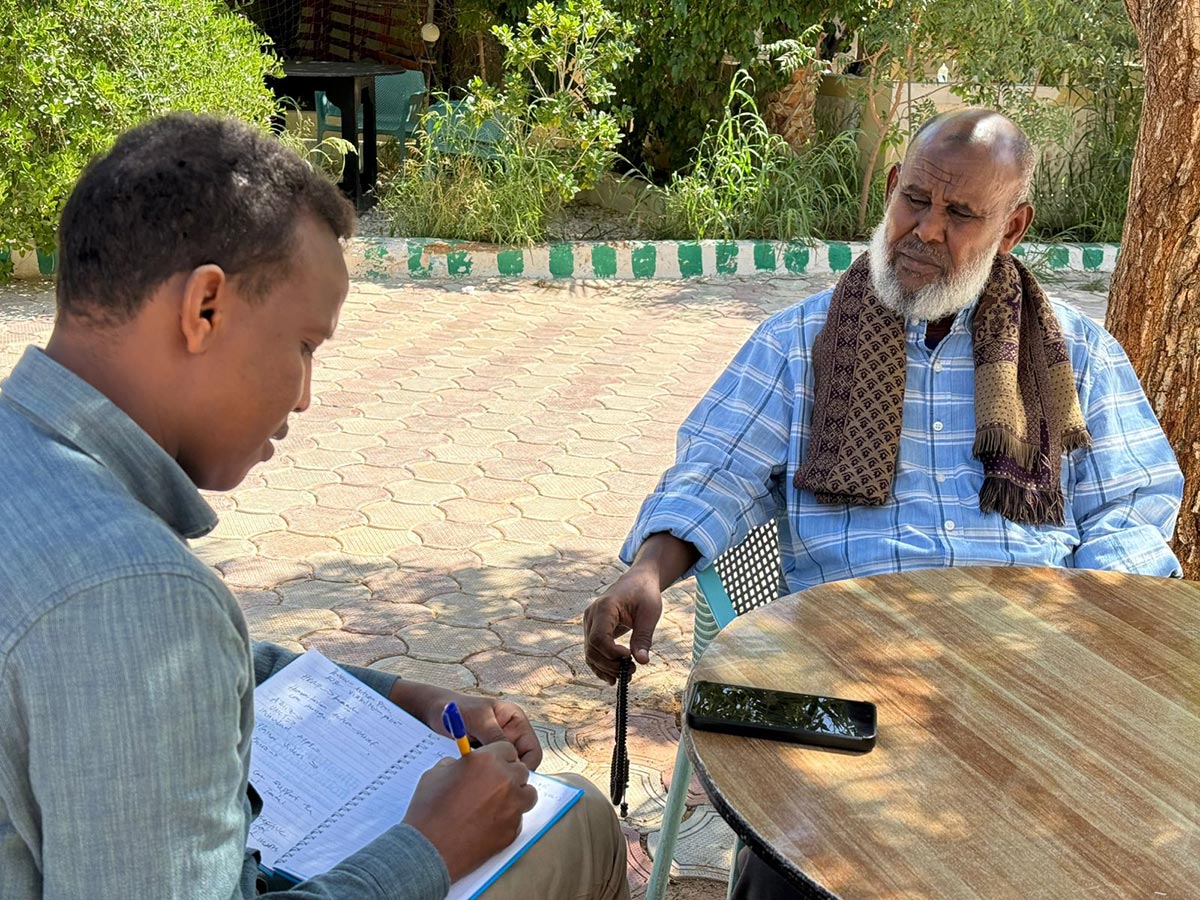 Retirement has not diminished Moalim’s commitment to his community. Now residing in Qardho, Puntland, approximately 200 km from his previous workplace in Bosaso, Ahmed continues to serve those in need. Though no longer in his formal position, he remains a key figure in his community, using his skills as a traditional orthopaedic practitioner to assist individuals with bone injuries.
Retirement has not diminished Moalim’s commitment to his community. Now residing in Qardho, Puntland, approximately 200 km from his previous workplace in Bosaso, Ahmed continues to serve those in need. Though no longer in his formal position, he remains a key figure in his community, using his skills as a traditional orthopaedic practitioner to assist individuals with bone injuries.
Living with his family of 11 children, Ahmed spends his days providing free orthopaedic care to those unable to afford treatment. People come not only from Qardho but from neighbouring areas as well. His work, done entirely without charge, is a heartfelt gift to the community, motivated by his strong sense of duty and faith.
“Being a traditional bone setter is another skill I have, one that Allah has blessed me with,” says Ahmed. “I use this skill to help the people. I don't take any money for it…I consider this work as charity, and I do it for the sake of Allah.”
Ahmed’s selfless contributions remind us that even after retirement, one can continue to have a profound impact on the lives of others. His service to the Somali people stands as a testament to his unwavering dedication and compassion. His legacy endures in every child vaccinated, every community protected and the health system he helped build for future generations.
For additional information, please contact:
Khadar Hared,
Communication Officer,
WHO Somalia.
Tel: +252619800011
Email:
Bringing health care closer to displaced communities in Somalia
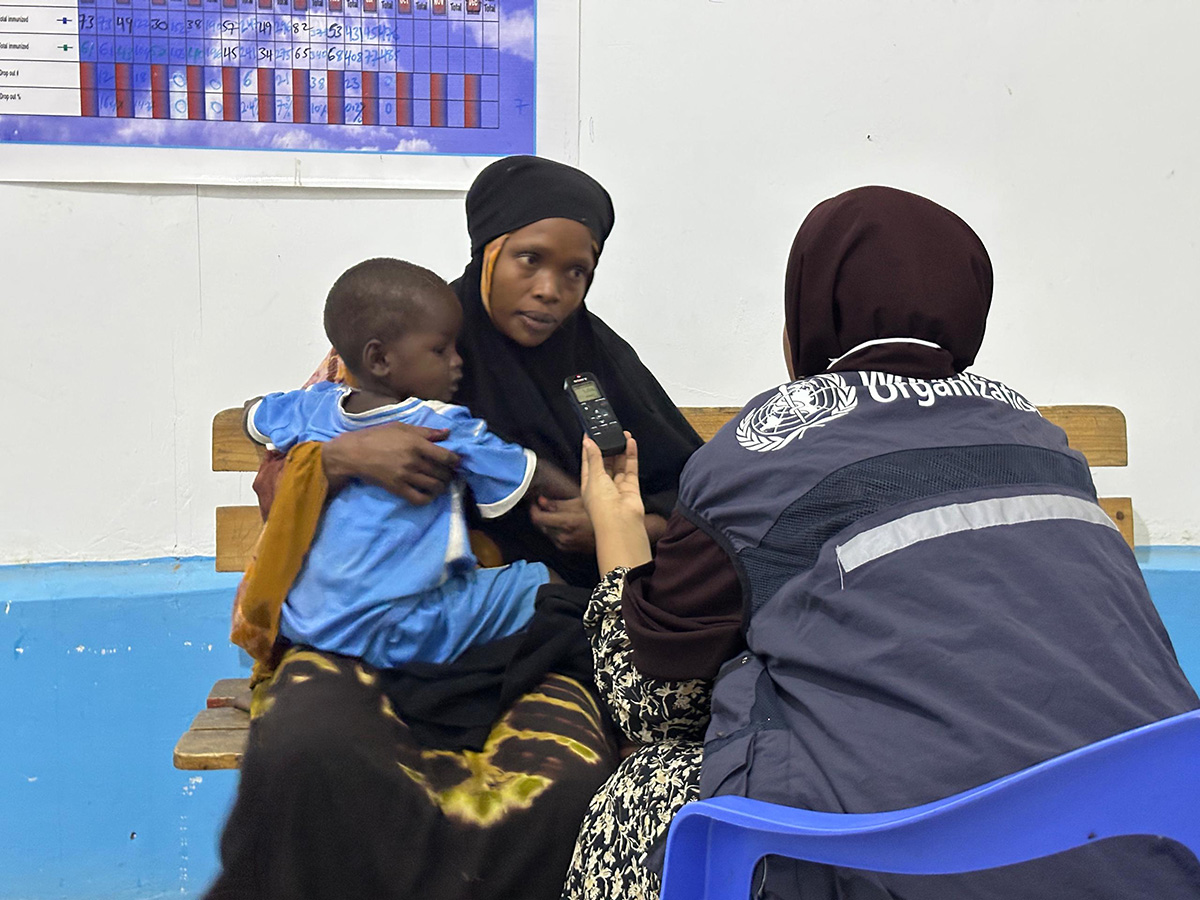 26 January 2025 – At the heart of Al-Adalada camp, west of Somalia’s capital Mogadishu, 49-year-old Hawa Sharif Ali has found a vital lifeline for her family’s medical needs. She, like the thousands of other internally displaced people (IDPs) living in the camp, depends on the health services available at the Sinkadheer health centre in the Garasbaley district.
26 January 2025 – At the heart of Al-Adalada camp, west of Somalia’s capital Mogadishu, 49-year-old Hawa Sharif Ali has found a vital lifeline for her family’s medical needs. She, like the thousands of other internally displaced people (IDPs) living in the camp, depends on the health services available at the Sinkadheer health centre in the Garasbaley district.
The mother of six supports her family by doing laundry in nearby neighbourhoods, including Garasbaley. Life has been a constant struggle for Hawa, made harder by the drought the country experienced in 2022/23 – one of the most severe in its history. Displacement, fighting to make ends meet and the responsibility of caring for her children, all weigh heavily on her.
Despite her struggles, she takes pride in managing her household and ensuring her children’s well-being. Amidst these challenges, she has found hope and support at the health centre.
In December 2024, Hawa took her youngest son, Abdulrahman Mohamed, aged two years and eight months, for his final measles vaccine, provided under the Expanded Programme on Immunization.
“I prioritize my child’s health. Each time I give birth, I bring my child here,” Hawa explained.
“We don’t have the money to go to private hospitals, but this centre is accessible for us. Today, my son received his measles vaccine to complete his immunizations, I have completed my other children’s routine immunizations and I’m happy.”
ECHO-supported health facilities transform lives
At the height of the drought in 2023, donors like the European Civil Protection and Humanitarian Aid Operations (ECHO) were quick to respond with increased funding to save lives through treating severe acute malnutrition and preventing and responding to disease outbreaks, including of vaccine-preventable diseases like measles. Through this funding, along with other donors, WHO has been able to not only meet the immediate needs of the people like Hawa and their families, but also strengthen local health clinics so they can continue to meet their communities’ needs into the future.
 Beyond routine immunizations, Sinkadheer health centre delivers a range of other health services under the Integrated Health and Nutrition Programme, bringing lifesaving care to families like Hawa’s, who would otherwise struggle to afford medical treatment.
Beyond routine immunizations, Sinkadheer health centre delivers a range of other health services under the Integrated Health and Nutrition Programme, bringing lifesaving care to families like Hawa’s, who would otherwise struggle to afford medical treatment.
The programme, supported by funding from ECHO, the German Federal Foreign Office and others, continues to transform the lives of Somali mothers and children, ensuring health and hope amidst the challenges of displacement.
Every day, the health centre becomes a humanitarian hub serving around 200 patients, the majority from nearby IDP communities. They seek not only general health services but also critical support for nutrition and the prevention of malnutrition.
For mothers, children and other vulnerable groups, the centre is a key source of support for their families’ health and well-being.
"Most of the people we serve here are mothers and children from the nearby IDP communities," says Mukhtar Derow Luqmaan, supervisor of Sinkadheer health centre.
"[They] depend on the integrated health services we provide. Every day, around 200 patients walk through our doors seeking care, nutrition support and protection from malnutrition. For them, this centre is a lifeline."
Partnerships for health in Somalia
Through collaboration with partners, WHO Somalia continues to support health care centres that provide a wide range of care and address the unique health challenges faced by displaced families. The aim is to bring practical health solutions closer to communities, ensuring no one is left behind.
"Thanks to with unwavering support from humanitarian donors like ECHO, WHO was quickly able to bring lifesaving health care to drought-affected communities in Somalia, giving vulnerable children and families a fighting chance. Now that the acute emergency has passed, we are continuing to strengthen the resilience of the health system to meet the immediate needs of their communities and to better withstand the next emergency. Together, we’re building a healthier, stronger future for every Somali family," says Dr Renee Van de Weerdt, WHO Representative in Somalia.
These humanitarian efforts, made possible by the generous contributions of ECHO and other partners, offer more than just medical care they bring hope and a renewed sense of possibility. Through this support, WHO and its partners are not only managing an emergency but are nurturing Somalia’s future by giving children the opportunity to grow healthy and strong, and mothers the chance to care for their families with dignity. This collective work in Somalia is a testament to the power of compassion and the difference it can make in the lives of those facing the greatest challenges.
For additional information, please contact:
Khadar Hared- WHO Somalia, Communication Officer-
New study estimates that 71 000 drought-related “excess” deaths may have occurred in Somalia between 2022 and 2024
About 40% of the deaths were of young children.
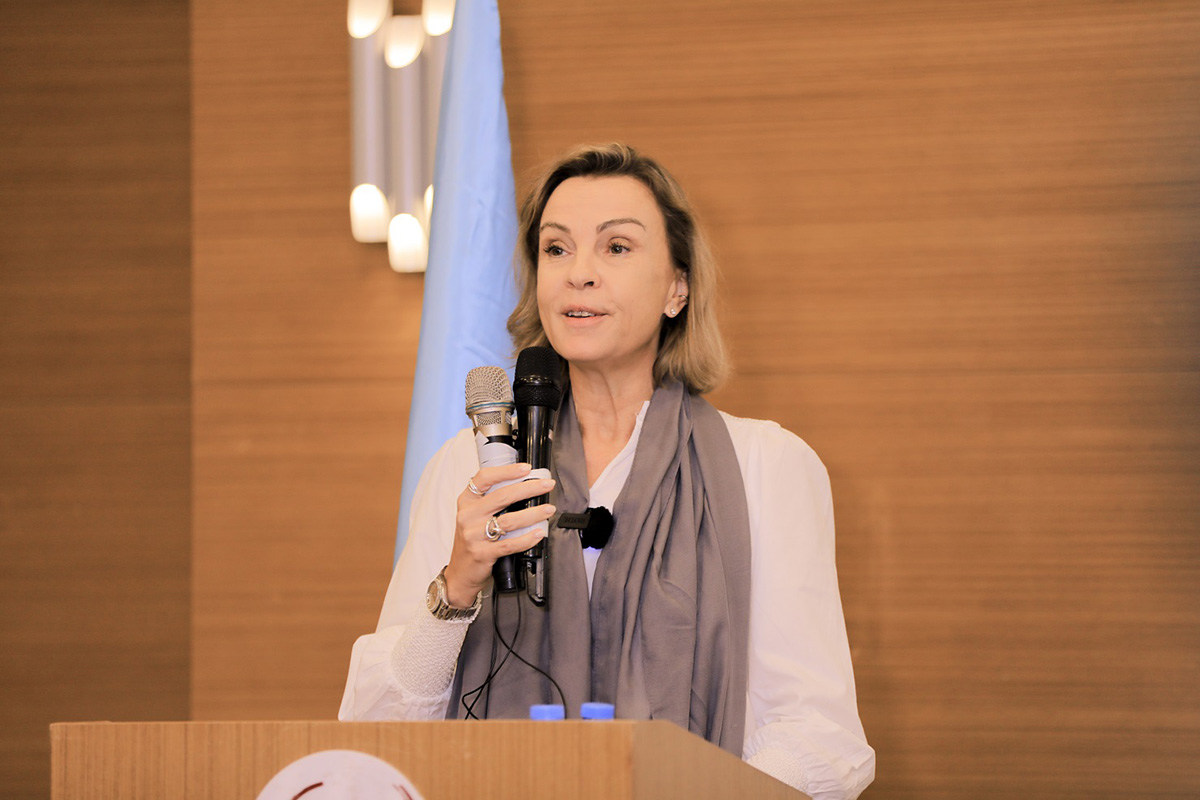 22 January 2025, Mogadishu, Somalia – A study released today by the Somali Federal Ministry of Health, UNICEF and WHO estimates that 71 100 people may have died between January 2022 and June 2024 because of the drought that ravaged large parts of Somalia in 2022. About 40% of these deaths were estimated among children under the age of 5.
22 January 2025, Mogadishu, Somalia – A study released today by the Somali Federal Ministry of Health, UNICEF and WHO estimates that 71 100 people may have died between January 2022 and June 2024 because of the drought that ravaged large parts of Somalia in 2022. About 40% of these deaths were estimated among children under the age of 5.
The report, From insight to action: an update on mortality patterns in Somalia, was released today in Mogadishu by Minister of Health Dr Ali Hadji Adam Abubakar. In attendance were Mr George Conway, Deputy Special Representative of the United Nations Secretary-General and Humanitarian Coordinator, Ms Wafaa Saeed, UNICEF Representative, and Dr Reinhilde Van de Weerdt, WHO Representative in Somalia.
The study, the fifth and final report in a planned series, provides a retrospective analysis of the impact of the drought on population mortality across Somalia during a 30-month period, which includes the 2022 drought that affected 7.9 million people, nearly half the population, and brought the country to the brink of famine. With the concerted efforts of the Government of Somalia and its humanitarian partners, famine was narrowly averted but Somalia was left counting the residual toll on human lives.
Commissioned by UNICEF and WHO and carried out by the London School of Hygiene and Tropical Medicine, Imperial College London, and Somalia’s SIMAD University, the study is an update on the first report published in March 2023 that estimated 43 000 excess deaths attributable to the 2022 drought. This latest study observes that most excess deaths occurred in the south-central regions of Somalia, including Banadir, Bay, and Lower Shabelle. Despite high levels of food insecurity, the north-east regions experienced relatively low levels of mortality.
 “For my Ministry, our focus is on creating a strong and robust health system as the cornerstone of a healthy and thriving Somali society,” says Health Minister Dr Ali Hadji Adam Abubakar. “At the heart of this approach is delivering health and nutrition services in an integrated manner, at the lowest unit of the health delivery chain, and in a way that gives priority to vulnerable children and women.”
“For my Ministry, our focus is on creating a strong and robust health system as the cornerstone of a healthy and thriving Somali society,” says Health Minister Dr Ali Hadji Adam Abubakar. “At the heart of this approach is delivering health and nutrition services in an integrated manner, at the lowest unit of the health delivery chain, and in a way that gives priority to vulnerable children and women.”
“The findings of this study highlight the profound impact that the 2022–2024 drought has had on the lives of the Somali people. With over 70 000 deaths, the majority of which were children, this is a stark reminder of the urgent need for continued support and resilience-building efforts in Somalia,” says WHO Representative Dr Renee van De Weerdt Renhilde. “This also underlines the critical importance of strengthening Somalia’s health emergency prevention, preparedness, readiness and resilience system to effectively respond to emergencies and provide sustained care for people in need. WHO continues to collaborate with the Somali government and partners to ensure that communities are not only protected during crises, but also empowered to withstand and recover from future shocks.”
 “This report serves as a serious and sad reminder of the devastating impact of climate change on vulnerable families in Somalia,” says UNICEF Representative Wafaa Saeed. “As resources to respond to humanitarian needs have become more limited, the government and its partners must continue to explore innovative investments to expand the reach of integrated life-saving services, including health, nutrition, water and sanitation. Given the recurring nature of climate-induced crises, we must also scale up investments in community resilience to future shocks, anticipatory action and prevention of disease outbreaks.”
“This report serves as a serious and sad reminder of the devastating impact of climate change on vulnerable families in Somalia,” says UNICEF Representative Wafaa Saeed. “As resources to respond to humanitarian needs have become more limited, the government and its partners must continue to explore innovative investments to expand the reach of integrated life-saving services, including health, nutrition, water and sanitation. Given the recurring nature of climate-induced crises, we must also scale up investments in community resilience to future shocks, anticipatory action and prevention of disease outbreaks.”
Recurrent shocks from climatic events such as drought and floods, as well as conflict and insecurity, and disease outbreaks, continue to exacerbate humanitarian needs in Somalia, alongside underlying factors such as widespread poverty, lack of diversified livelihoods and equitable economic growth, insecurity and marginalization, and weak basic service delivery systems.
The latest report by the Integrated Food Security Phase Classification initiative, a food security partnership that includes governments, United Nations agencies, nongovernmental organizations and others, released in September 2024, shows that extreme acute food insecurity remains widespread, with 4.4 million people predicted to experience crisis levels of hunger and 1.6 million children expected to be acutely malnourished this year, placing them at higher risk of death and permanent developmental delay.
A summary of the report can be downloaded here.
For additional information, please contact:
Federal Republic of Somalia Ministry of Health and Human Services:
UNICEF: Victor Chinyama,
WHO: Myriam Haberecht,
Breaking the cycle: addressing recurring cholera outbreaks in Somalia
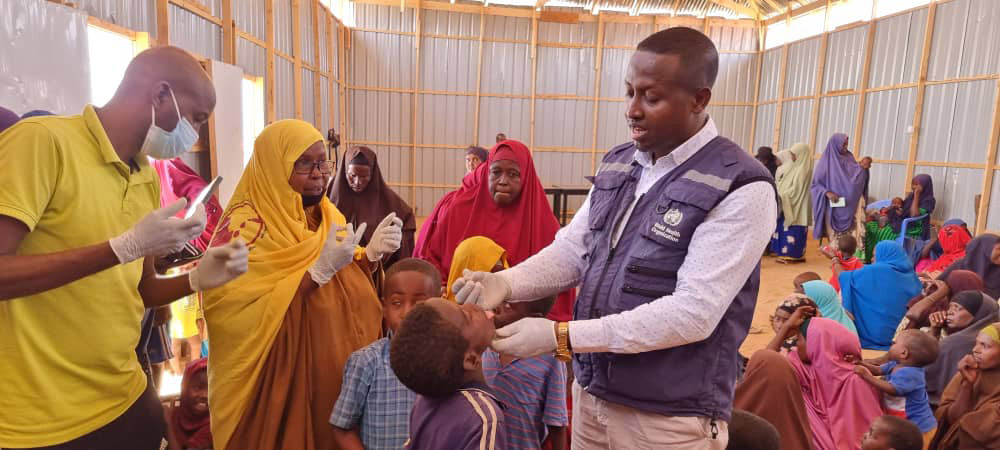
4 November 2024, Mogadishu, Somalia – Since the early 1990s, Somalia has suffered multiple outbreaks of cholera which, due to poor sanitary conditions, have affected a majority of the population living in internally displaced camps.
The latest outbreak occurred early in 2024 in the capital Mogadishu, with the districts of Dayniile, Dharkaynley, Wadajir, Kahda and Hamar Jajab particularly badly affected. In response, the Federal Ministry of Health and Human Services and the Banadir Health Administration, with the support of WHO, UNICEF and other partners, promptly embarked on a door-to-door cholera vaccination campaign targeting the affected districts to prevent the spread of the disease. Staff also conducted awareness-raising activities to educate residents on how to control the spread of cholera.
WHO polio programme assets and expertise were deployed to support the response activities. Hawa Abdullahi Ali, 55-years-old, who has worked on polio campaigns in Kahda since 1998, first as a vaccinator and then in her current position as District Polio Officer, was among the experienced team that WHO relied on to deliver relief to thousands of residents in the high risk district of Kahda in May 2024.
Hawa says the experience underlined the importance of delivering high quality interventions to vulnerable residents.
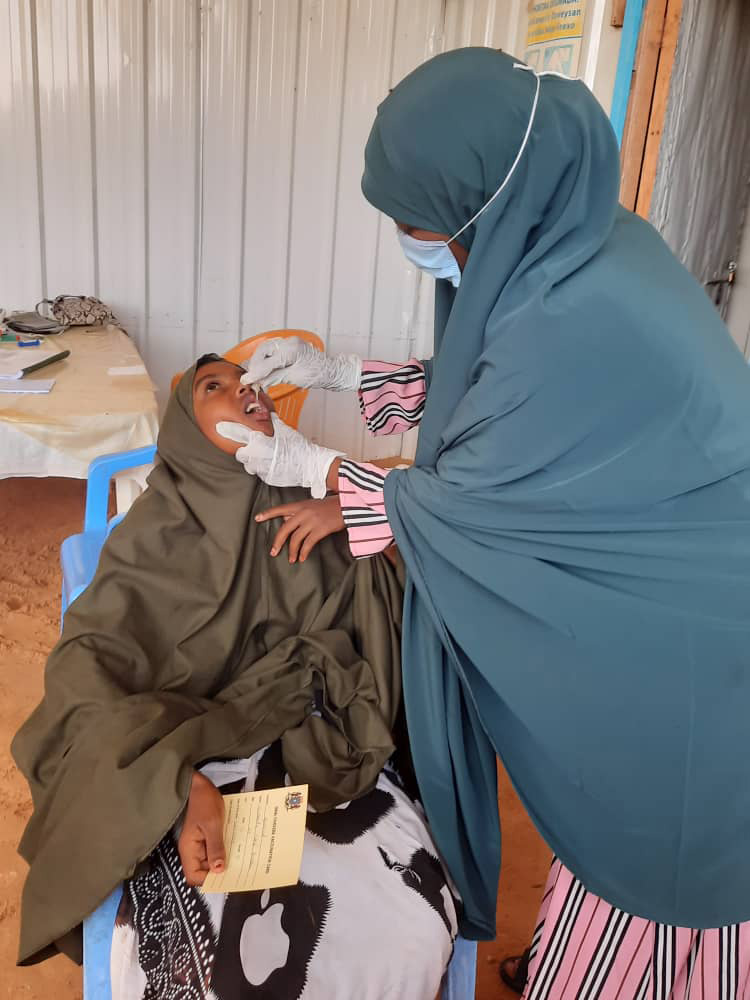 It is not the first time Hawa and her colleagues working in the polio programme have delivered on other public health priorities. They were also responsible for building coordination and strengthening surveillance during the COVID-19 pandemic response.
It is not the first time Hawa and her colleagues working in the polio programme have delivered on other public health priorities. They were also responsible for building coordination and strengthening surveillance during the COVID-19 pandemic response.
"The contribution of the polio workforce in responding to other public health emergencies is critical to the overall service delivered to vulnerable people. Protecting those most at risk, in the communities in the most at-risk areas, is key to reducing infections and saving lives,” says Hawa.
“By rapidly responding to the cholera outbreaks we were able to limit transmission, safeguard communities and prevent our health systems being overwhelmed.”
Through efforts like that of Hawa, the WHO polio programme, with the support of the Government and other partners, successfully vaccinated over 1 244 687 people aged one year and older with the oral cholera vaccine (OCV) across 12 districts in 5 states in May 2024.
“Our dedicated team, which included 244 district field assistants, 12 district polio officers, 10 regional polio officers, 5 state polio officers, state data assistants, national data managers, state SIA coordinators and over 2196 vaccinators and recorders, played a crucial role in this achievement,” said WHO Somalia’s Immunization Coordinator Dr Gedi Mohamed.
Hawa believes her team’s efforts not only protected locals from cholera but also inspired hope among vulnerable families who viewed the health workers as a lifeline during this critical time.
"As a team, we understood that every vaccine we delivered could mean the difference between life and death. The trust we've built within the community empowered us to reach more people than we imagined. It was incredible to see mothers lining up, knowing that together we were safeguarding the future of our children.”
Cholera remains a major public health challenge in Somalia, especially in regions affected by conflict and displacement, and with limited access to clean water and sanitation.
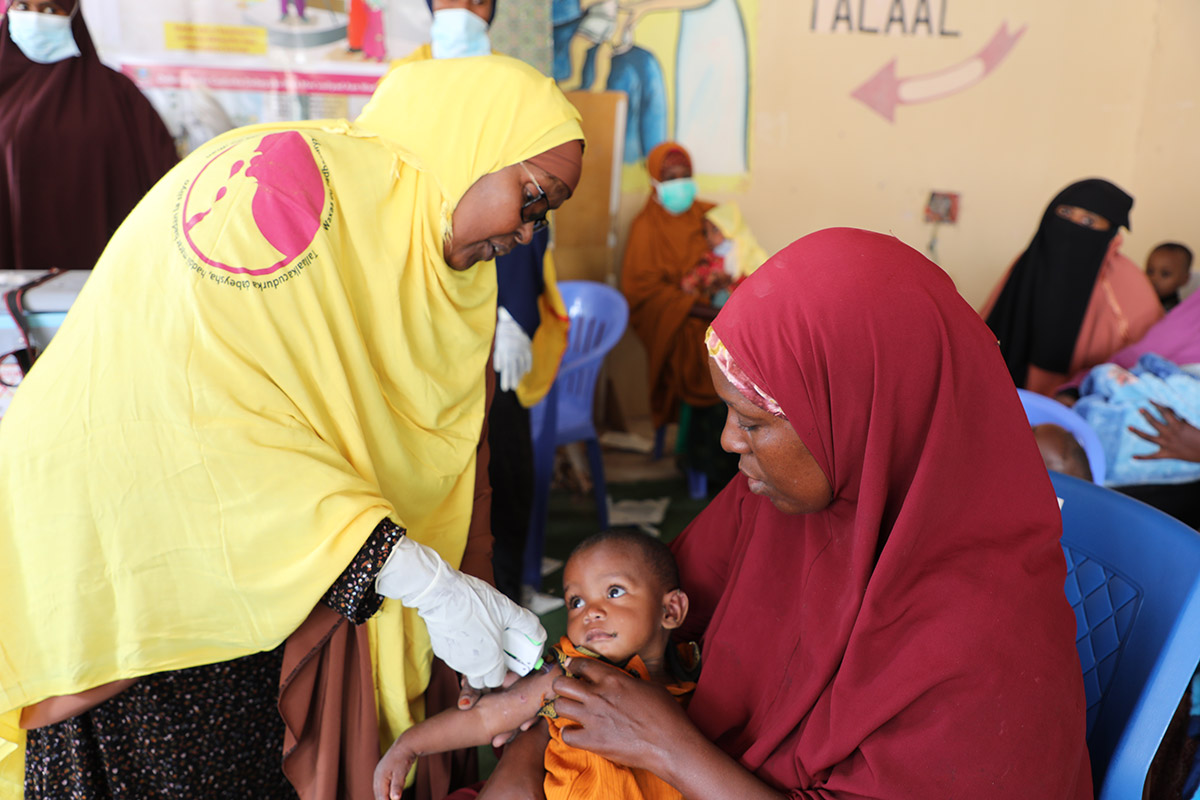 Over the years, cholera outbreaks have claimed many lives and placed immense pressure on Somalia's fragile health care system. Coordinated efforts by the Government of Somalia, WHO and partners have been instrumental in reducing the impact of the disease through rapid response measures, health education and vaccination campaigns.
Over the years, cholera outbreaks have claimed many lives and placed immense pressure on Somalia's fragile health care system. Coordinated efforts by the Government of Somalia, WHO and partners have been instrumental in reducing the impact of the disease through rapid response measures, health education and vaccination campaigns.
In the last four weeks, 768 new cholera cases have been reported from 31 districts, with a rise in cases in the areas of Kismayu, Jowhar, Marka, Burhakab, Barawe, Borama and Baidoa. Of these cases, 399 (52.0%) were female and 407 (53%) were children under 5 years.
To control cholera and prevent future outbreaks, it is crucial that all stakeholders prioritize sustainable access to clean water and improved sanitation and support the widespread delivery of cholera vaccines. Together, these actions can protect vulnerable populations and ensure that life-saving health services reach those most in need.








